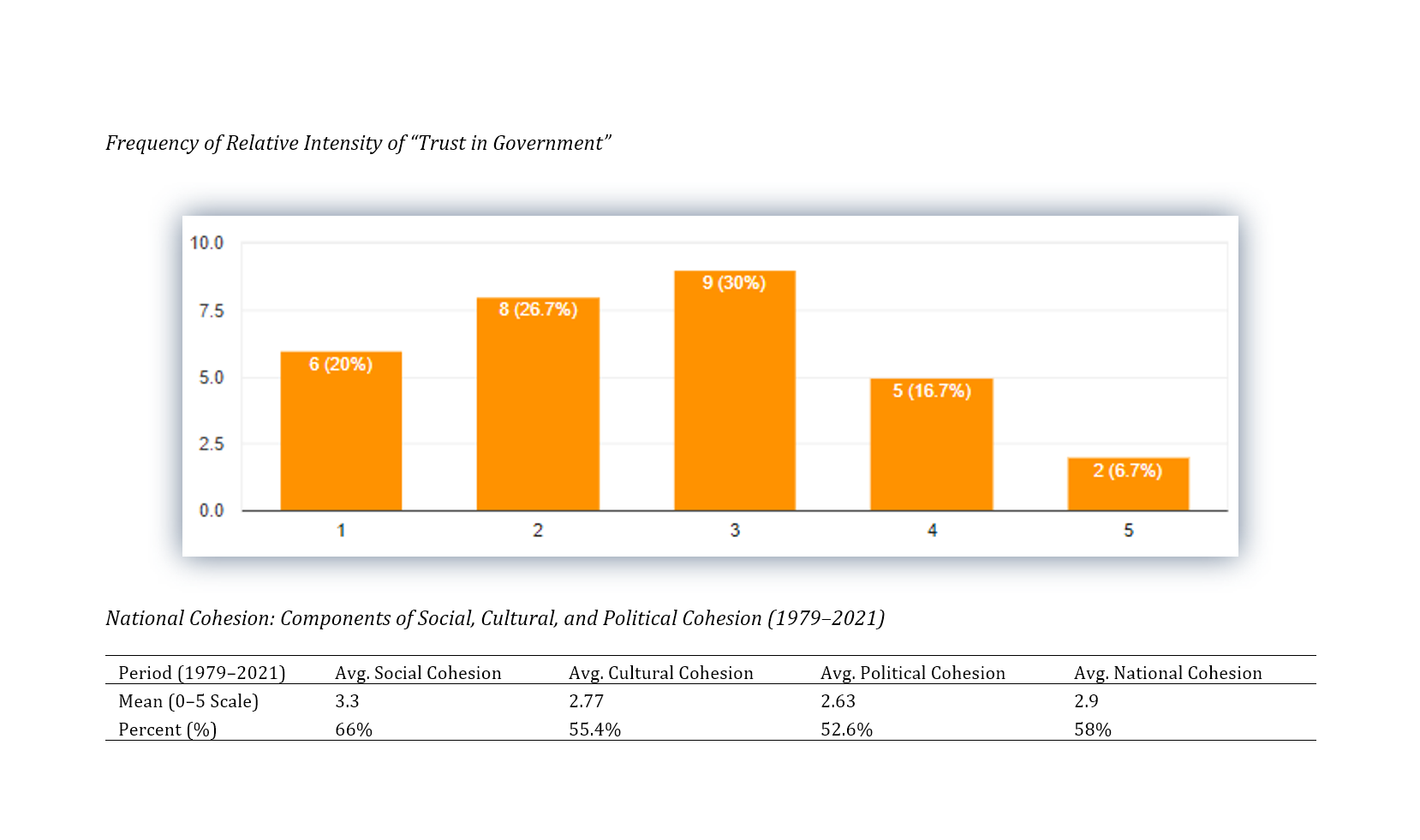The Impact of Local Governance Models on National Unity and Cohesion After the Victory of the Islamic Revolution in Iran
Keywords:
National cohesion, local governance, Islamic Revolution, Islamic Political Philosophy, social, culturalAbstract
This article examines the impact of local governance models on national unity and cohesion in Iran following the victory of the Islamic Revolution. Employing a historical-analytical approach and drawing upon existing documents and records, the study investigates the transformations in the local governance system from the era of initial democratic decentralization (1979–1988) to the hybrid bureaucratic and decentralized model (1988–2021). Focusing on the tripartite dimensions of national cohesion—namely, social cohesion (emphasizing social inclusion and equality), cultural cohesion (emphasizing cultural identity), and political cohesion (emphasizing political participation and trust in the government)—this study analyzes how each governance model has contributed to either strengthening or weakening national cohesion. Findings indicate that in the realm of social cohesion, although efforts have been made to enhance social inclusion and social justice, challenges such as the expansion of state bureaucracy and dependency on oil rent have posed significant obstacles. In the area of cultural cohesion, there has been a notable emphasis on Islamic values and traditions within the framework of the Islamic Republic; however, concerns have also emerged regarding political restrictions and their impact on cultural diversity. This study demonstrates that national cohesion is a multifaceted concept requiring a balance between social, cultural, and political components, as well as a nuanced understanding of the diversity of local communities. Ultimately, it is concluded that effective local governance can play a pivotal role in enhancing national cohesion by promoting local participation, reinforcing social inclusion, and fostering trust and collaboration.
Downloads
References
Aminian, B. (2007). "The Impact of National Identity on Generational Bonds.". Youth Research, Culture, and Society (Youth and Generational Relations)(1), 72-81.
Anderson, P. K. L. (2022). Local Government and Community Participation; Prospect of the Unit Committee Model in Ghana's Decentralization Program. International Journal of Research and Innovation in Social Science, 143-149. https://doi.org/10.47772/ijriss.2022.6411
Badii Azandahi, M., Vasegh, M., Malek Mohammadi, H., & Alam, R. (2018). "Governance in the 21st Century and Its Challenges.". Political Space Planning Quarterly, 1IS - 2, 180-188.
Bassford, C. (2007). Clausewitz and His Works. Oxford University Press.
Chadwick, F. A. (2010). Expanding Governmental Diversity in Global Governance: Parliamentarians of States and Local Governments. Global Governance: A Review of Multilateralism and International Organizations, 16, 59-79. https://doi.org/10.1163/19426720-01601005
Chyrko, B. V. (2021). THE ORGANIZATION OF STATE GOVERNANCE AND LOCAL SELF-GOVERNMENTS OF GERMAN SETTLERS' COLONIES IN RUSSIAN EMPIRE (2ND HALF OF XVIII TO EARLY XIX CENTURY). Scientific notes of Taurida National V.I. Vernadsky University, series Historical Sciences, 78-84. https://doi.org/10.32838/2663-5984/2021/2.11
Dekker, H. (2004). Control of Inter-Organizational Relationships: Evidence on Appropriation Concerns and Coordination Requirements. Accounting, Organizations and Society, 29, 27-49. https://doi.org/10.1016/S0361-3682(02)00056-9
Fukuyama, F. (2018). Identity: The demand for dignity and the politics of resentment. Farrar, Straus and Giroux.
Hafeznia, M. R. K. R. M. (2014). Philosophy of Political Geography. Strategic Studies Research Institute Publications.
Hyrenko, L. (2022). DIGITALIZATION OF LOCAL SELF-GOVERNMENT IN THE CONDITIONS OF DECENTRALIZATION REFORM: THEORETICAL AND ORGANIZATIONAL ASPECTS. Electronic scientific publication "Public Administration and National Security". https://doi.org/10.25313/2617-572x-2022-2-7946
Liberati, P., & Sacchi, A. (2012). Tax decentralization and local government size. Public Choice, 157, 183-205. https://doi.org/10.1007/s11127-012-9937-9
Memarzadeh, G., & Ahmadi, M. (2013). "The Concept of Organizational Social Accountability and the Need to Design a Mechanism for Its Evaluation in Iran's Public Sector.". Volume 5, Issue 14, 1-7.
Midri, A. (2006). "An Introduction to the Theory of Good Governance.". Social Welfare, 6(22), 261-287ER -.
Midri, A., & Kheirkhah, J. (2004). Good Governance: The Foundation of Development. Parliamentary Research Center.
Mohammad Zadeh Asl, M., Manoochehr Tabatabei, M., Heibatollah, N., Hoseein, M., & Manoochehr Tavasoli, N. (2016). Legal Analysis of the Role of Islamic Urban and Rural Councils in Administrative Decentralization and Local Democracy in Iran. Journal of Politics and Law, 9(8), 1. https://doi.org/10.5539/jpl.v9n8p1
Naderi, M. M. (2011). "Good Governance: An Introduction and Brief Critique.". Islam and Managerial Research(1), 0-0.
Qalibaf, M. B. (2001). Analytical Study of the Evolution of Local Institutions in Contemporary Iran and Proposing an Appropriate Model
Seifollahi, S., & Hafez Amini, H. (2009). "Economic-Social Development Plans and Their Impact on Divergence and Convergence of Ethnic Groups in Iran.". Social Sciences Research Quarterly, 3(2), 67-98.
Sherifi, E. (2016). Historical Overview on Decentralization and local Government of Albani. Academic Journal of Interdisciplinary Studies. https://doi.org/10.5901/ajis.2016.v5n2p227ER -
Veisi, H. (2013). "Examining Local Government Models and Comparing Them with Iranian Cities.". Geography and Development(33), 60-71.
Walzer, M. (2004). Politics and passion: Toward a more egalitarian liberalism. Yale University Press.
Weber, M., & Talcott, P. (1920). The Theory Of Social And Economic Organization. the University of Michigan.
Woolcock, M., & Narayan, D. (2000). Social capital: Implications for development theory, research, and policy. https://doi.org/10.1093/wbro/15.2.225
Zareh Nistanak, M. (2015). "The Relationship Between National Identity and Unity and National Cohesion in Iran.". Eighth Congress of the Iranian Geopolitical Association: Solidarity of Iranian Ethnic Groups, National Cohesion, and Authority.
Zarghani, S. H., & Ahmadi, E. (2019). "Good Governance in Local Governments: Decentralization.". Allameh Tabataba'i University, State Research, 107-138.

Downloads
Additional Files
Published
Submitted
Revised
Accepted
Issue
Section
License
Copyright (c) 2025 Seyed Sajjad Mousavi Nezhadbanam, Mir ghasem Banihashemi, Garineh Keshishyan siraki, Hasan khodaverdi (Author)

This work is licensed under a Creative Commons Attribution-NonCommercial 4.0 International License.





